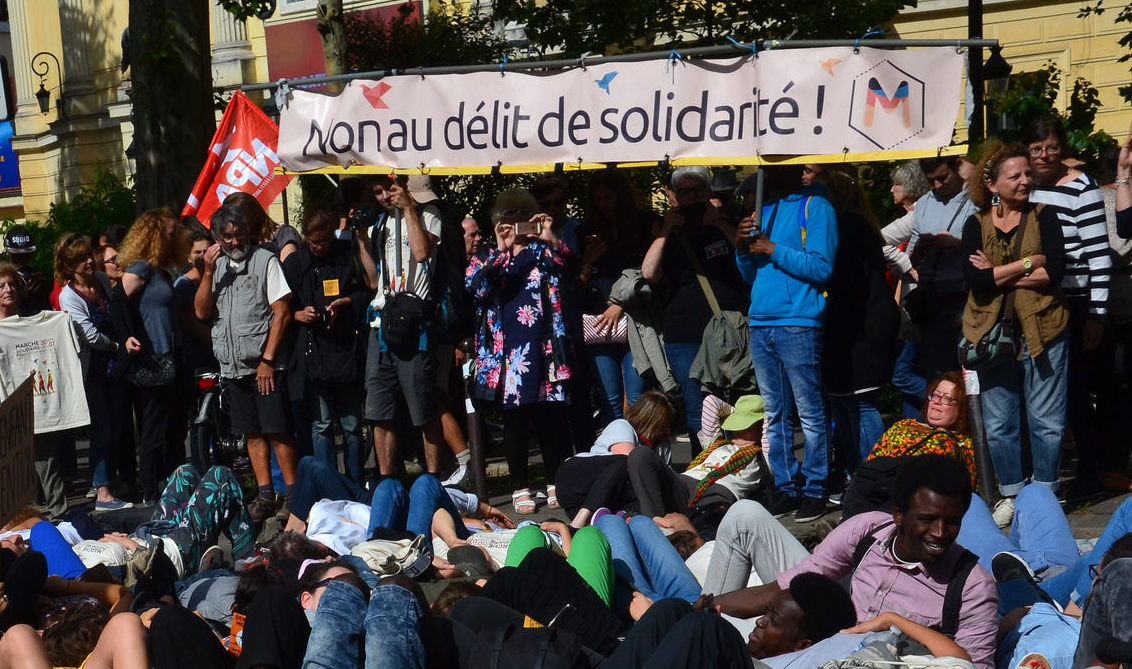On 22 April, Bastien, Benoît, Eleonora, Juan, Lisa, Mathieu and Théo crossed the border between France and Italy in the region of Briançon during a peaceful demonstration in support of migrants. By chance, a few migrants ‘with irregular status’ were found among them when they were stopped by local border patrol. The seven went on trial on 8 November, charged with organising the illegal entry of these individuals into French territory.
This prosecution seem to run counter to a Constitutional Court decision, in July 2018, recognising ‘fraternity’ (and by extension, solidarity actions) as embedded in the French Constitution, alongside the principles of liberty and equality. Moreover, the sentencing requested by the public prosecutor, a minimum of 4 months in prison for at least two of the defenders, is ‘extremely harsh, given the facts of the case,’ says Violaine Carrère, a lawyer with the French NGO GISTI, specialised in assistance to migrants.
‘The decision of the French authorities to use the justice system to punish those who help migrants and asylum-seekers seems clearly motivated by more than a strict application of the law’, says ISHR’s Sarah M Brooks, who follows issues of migrant rights defenders globally.
The ‘facts of the case’ include that the demonstration in which the group, known now as the ‘Briançon 7’, was involved was a peaceful, but clear, repudiation of another demonstration by a far-right group. This group, ‘Génération Identitaire’ has claimed the right to stop migrants, turn them in to the police, and disseminate what Carrère calls ‘hate speech’. For its part, Génération Identitaire has not faced a single legal action.
French law not in line with international standards
The case against the Briançon 7 has its legal basis in an assertion that the individuals violated French law relevant to entry and stay of foreigners. Unfortunately, though civil society has successfully advocated that the law specify that exceptions (e.g., immunity) are allowed for assistance in certain cases such as ‘imminent danger’, this has not evolved to include cases pertaining to ‘assistance in entering the French territory’.
For years, NGOs in France have called for changes to the law sanctioning assistance for illegal entry. According to GISTI, the current provision, Article L. 622-1, dates from 1938 and was originally intended to protect migrants – and the French labour market – from abuse by unscrupulous employers. From early on, however, lawyers and activists have seen this applied to those who assist migrants without any expectation of financial gain, for example those who have given migrants shelter in their homes.
‘There has been an acceleration in such prosecutions by the State since the 2000s’, says Carrère. In light of large migration flows in 2015 and 2016, ‘The State abandons people barefoot in the snow, simply because they are migrants’, she continues, ‘while prosecuting those who try to assist them’.
Instead, says Brooks, the energy and creativity of prosecutors – using not only entry and exit law, but also laws on construction, public health, and endangerment – send a clear signal. Some migrant defenders have been prosecuted for infringement of the Town Planning Code for having built a shelter without authorisation; for violation of hygiene rules for distributing food; and for endangering life for transporting a child out of the ‘Calais Jungle’.
‘It is patently clear that the overall aim is to discourage efforts by civil society to witness and redress the failures of the French State to live up to its obligations and protect people on the move’, says Brooks.
Violaine Carrère of GISTI agrees, seeing the case as a bellwether for civil society and part of a general movement to intimidate and discourage ordinary citizens from standing with people on the move.
Whether spontaneous humanitarian action or clearly political acts in rejection of State policies, both are important ways for migrant rights defenders and organisations to respond to migration policies seen as repressive. It is an exercise of the freedoms of expression and of assembly, which are at the core of the French State and French identity. This kind of solidarity action is also protected in the UN Declaration on Human Rights Defenders. This critical UN text provides that anyone has the right to ‘file a complaint about the policies and actions of individual officials and governmental bodies with regard to violations of human rights and fundamental freedoms, by petition or other appropriate means’ (Art. 9), as well as the right to ‘participate in peaceful activities against violations of human rights and fundamental freedoms’ (Art. 12).
Uncertain verdict, obvious injustice
A final verdict for the Briançon 7 is expected on 13 December. While charges of organised crime have been dropped by the prosecutor, meaning each of the seven will be charged as an individual, the lawyer Leclerc finds the entire process ‘absurd’.
‘There is no proof that these people did anything but engage in a peaceful demonstration, which is not a crime. There is no longer any legal basis for the case,’ says Leclerc.
As a strong supporter of human rights defenders and fundamental freedoms around the globe, the French government should ensure that its own domestic policies are consistent, and that no one is criminalised for seeking to promote and protect the rights of others, regardless of migratory status.
UPDATE: On 13 December, the Briançon 7 were all found guilty of supporting the illegal entry of undocumented migrants into France. Five of them received a six-month suspended sentence; the other two received a twelve-month sentence with an eight-month suspension.
FlicR/Jeanne Menjoulet




